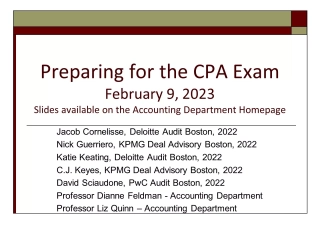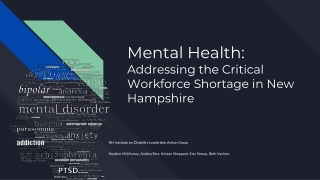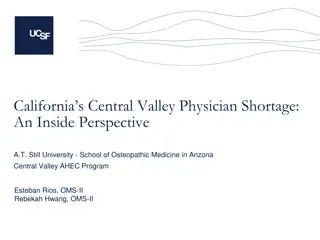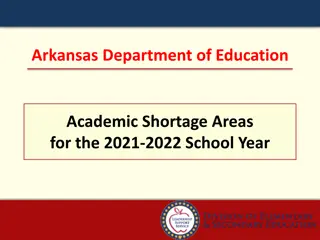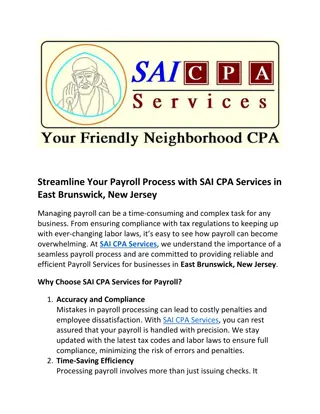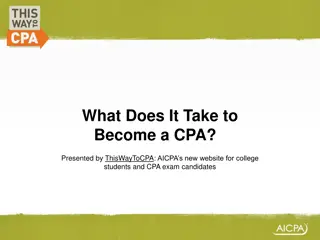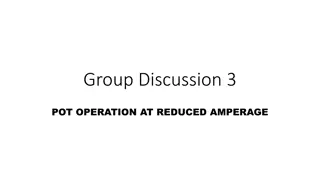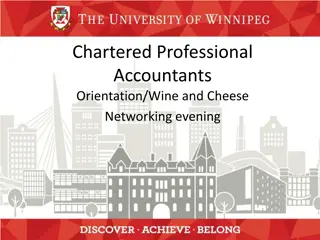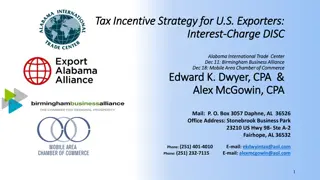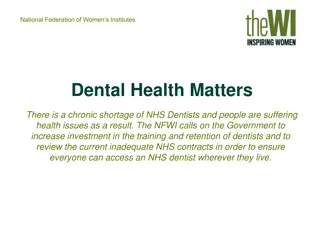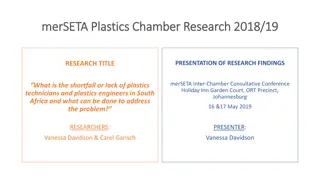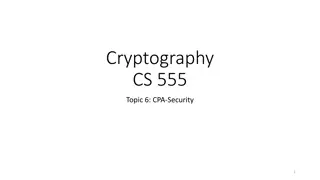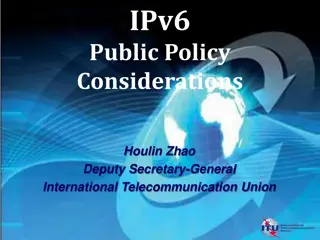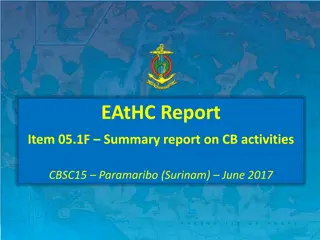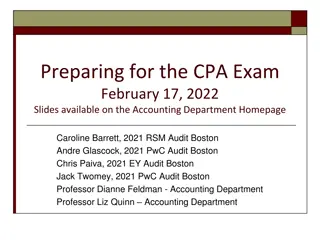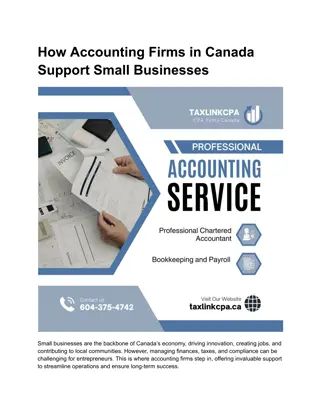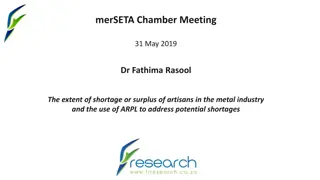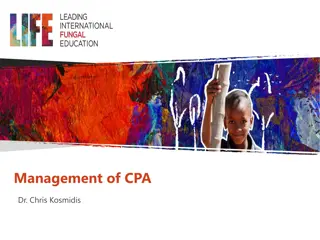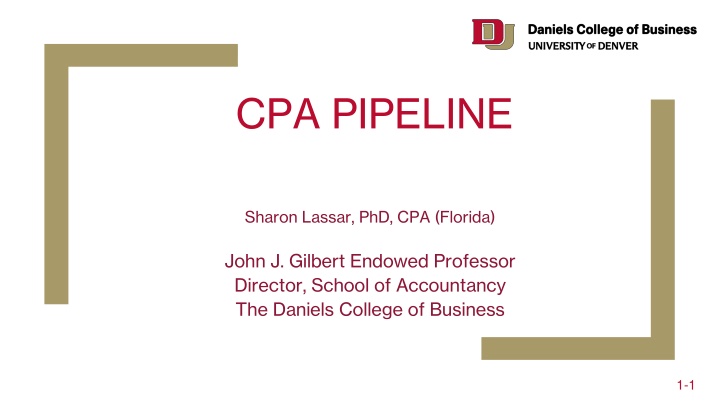
Evolution of CPA Designation and Education Requirements
Explore the history of the CPA designation, the development of licensing rules, the formation of professional bodies, and the evolution of education requirements for CPAs in the United States from the late 19th century to the late 20th century. Learn about the pivotal role of various organizations and the impact of landmark reports on shaping the accounting profession.
Download Presentation

Please find below an Image/Link to download the presentation.
The content on the website is provided AS IS for your information and personal use only. It may not be sold, licensed, or shared on other websites without obtaining consent from the author. If you encounter any issues during the download, it is possible that the publisher has removed the file from their server.
You are allowed to download the files provided on this website for personal or commercial use, subject to the condition that they are used lawfully. All files are the property of their respective owners.
The content on the website is provided AS IS for your information and personal use only. It may not be sold, licensed, or shared on other websites without obtaining consent from the author.
E N D
Presentation Transcript
CPA PIPELINE Sharon Lassar, PhD, CPA (Florida) John J. Gilbert Endowed Professor Director, School of Accountancy The Daniels College of Business 1-1
History of a CPA The need for reliable accounting information grew with capital markets only a CPA can attest to fairness of financial statements. CPA can attest to fairness of financial statements. 1882 membership in the NY Institute of Accounts required passing a test. 1892 American Assoc of Public Accountants forms a college of accounts and required candidates to complete 1000 hours of training. Also called for restricting practice to those passing the exam plus 5 years of experience. NYIA competing proposal did not restrict practice but called for exam to hold oneself out as CPA. NYIA and AAPA joined forces to support legislation. 1896 first law establishing the CPA designation (with exam required). 1899 College of Commerce Accounts and Finance at NYU. Other states followed the NY example, but with differing education and experience requirements. only a
Mobility Issues from the Beginning Federation of State Societies of Public Accountants, 1902. Model CPA law created. Journal of Accountancy taken over from Illinois Society of CPAs. The lead article in the very first issue (November 1905) was Education and Training of a Certified Public Accountant , by J.E. Sterrett. 39 States had licensing rules by 1905. American Institute of Accounts was eventually formed and created a CPA exam in 1917. American Society of CPAs was a rival group formed about the same time. Disunity became an issue with the Depression. The two merged in 1937, created Uniform CPA exam in 1952, and changed name to AICPA in 1956.
1950s Focus on Education In the US, the states placed accounting education in universities to legitimize education (and perhaps shift the burden of providing it). In the UK, the professional body regulates who can practice and it educates them via a structured learning program. In the US, the states control. The Perry Commission (1952-56) called for more than a bachelor s degree a professional school (like law or medicine). Only three states required college education for CPAs at that time (NY, NJ & FL). In 1959, the Carnegie and Ford Foundations influenced education and called for 4-year bachelor degrees; accounting study was proposed to be about 50% liberal arts, 30% business, 25% accounting (rounded).
Numerous Studies & Commissions Following the issuance of the Horizons Report in 1967, the AICPA had adopted a policy stating that at least five years of college study are needed to cover the common body of knowledge expected for CPAs. NASBA adopted policy in 1976. In the 1970s government became involved. The Metcalf report called for Congressional regulation of accounting practices and the need for competition among accounting firms for selection as independent auditors for major corporations. A 1978 policy statement by the AICPA explicitly called for a graduate degree for entering the profession. The statement was repeated in 1988 but the 1987 AICPA Council resolution called for new members after 2000 having 150 hours of education (without a graduate degree).
Focus on Credit Hours NASBA and the AICPA worked together to develop, in 1984, a Model Public Accountancy Act, which included a requirement of 30 semester hours beyond the baccalaureate degree. The 1978 AICPA Policy Statement calling for a graduate degree was revised in the 1988 reconsideration. Specific coursework recommendations were removed and replaced with broad guidelines including 35 to no more than 50 hours in business education and 25 to 40 hours of education in accounting. Some states very prescriptive. Florida, for example, was very specific and noted a substantial increase in the CPA exam pass rate after adoption. By 1999, academics were questioning the 150-hour requirement. See Albrecht & Sack (1999), authors of Charting the Course through a Perilous Future (2000).
Macro Trends Decline in number of CPA candidates followed implementation of 150-hour rule, even as the number of accounting majors increased. Some states had changed licensing rule to 150, but not the rule to sit for the exam. In 2008, 19 states allowed candidates to sit at 120 hours. Alternative certifications proliferated. By 2010 about 35 were available. Accounting standards proliferated. Restrictive rules make work less interesting. Investments in software is associated with lower employment and wage growth (see 2024 working paper by Friedman, Sutherland & Vetter). Three-year degrees are on the horizon. BYU-Idaho s has been approved. The State of Indiana just passed legislation requiring 3-year degrees.
Salary Trends A 2008 paper noted In 1985, a MACC graduate with a Big 4 firm in NYC earned approximately 69 percent $31,200/$45,500of the starting salary of an investment banker, and 60 percent $31,200/$52,000 of the starting salary of an associate at a NYC law firm. In 2007, a MACC graduate earned 35 percent $65,000/$185,000of the starting salary of an investment banker and only 45 percent $65,000/$145,000 of the starting salary of an attorney. Carcello, 2008 Current Issues in Auditing. Friedman, Sutherland & Vetter, 2024 notes another decade of decline 2009-2019 using American Community Survey - wages for accounting majors went from being about $5,000 below median wages for finance majors to $17,000 below. Mobility reduced pay. See Cascino, Tamayo, and Vetter 2021 Journal of Accounting Research.
Demographic Trends The number of traditional-age students is declining nationwide, with the vast majority of states expecting to see declines in college-going students. In 1990, 22% of undergraduate business school graduates were accounting majors and 10% were finance majors. By 2021, it was 14% and 16% (FSV). FAFSA filing rates were 54% for classes of 2017-2019, 52% for 2020, 50% for 2021 then started ticking back up until current fiasco. Last week Inside Higher Ed reported completion rates are down 27% year over year. 30% of entering students question whether college is worth it. Students are influenced by A class they took 80% Mentor, role model, teacher 75% Adult family member or friend s occupation 70%
Pipeline Solutions? AICPA created ELE Experience, Learn, and Earn program for students to complete 30 credit hours of online education through an extension-type program at a university while working. EY has a program for students to earn up to 20 credit hours through online courses at a particular university. PWC and others have partnered with universities in NJ for 30 hour internship States are relaxing prescriptive rules over curriculum. Reducing the education requirement does not reduce the knowledge & skills required. Professionals should earn graduate degrees. The market will value a good graduate education.

